Financial Accounting Report: Non-Financial Performance and Reporting
VerifiedAdded on 2022/10/19
|8
|1706
|348
Report
AI Summary
This report examines the significance of non-financial reporting within financial accounting, focusing on the nature of non-financial information, its economic consequences, and the processes involved in reporting and disclosure. It explores various aspects, including Corporate Social Responsibility (CSR), Environmental, Social, and Governance (ESG) factors, and green banking disclosures, highlighting their impact on stakeholders, investment decisions, and corporate strategy. The report discusses how non-financial performance influences stock prices, investor sentiments, and access to funding. It also outlines the reporting practices, including the use of corporate websites and sustainable business reports, and emphasizes the importance of transparency and adherence to guidelines such as the Global Reporting Initiative and the COSO Internal Control framework. Furthermore, the report addresses the consequences of non-financial reporting, emphasizing its long-term value creation, risk management benefits, and the importance of addressing potential issues such as discrimination and human rights concerns. The conclusion reinforces the importance of comprehensive non-financial information for informed decision-making in the financial market.

FINANCIAL ACCOUNTING
Paraphrase This Document
Need a fresh take? Get an instant paraphrase of this document with our AI Paraphraser
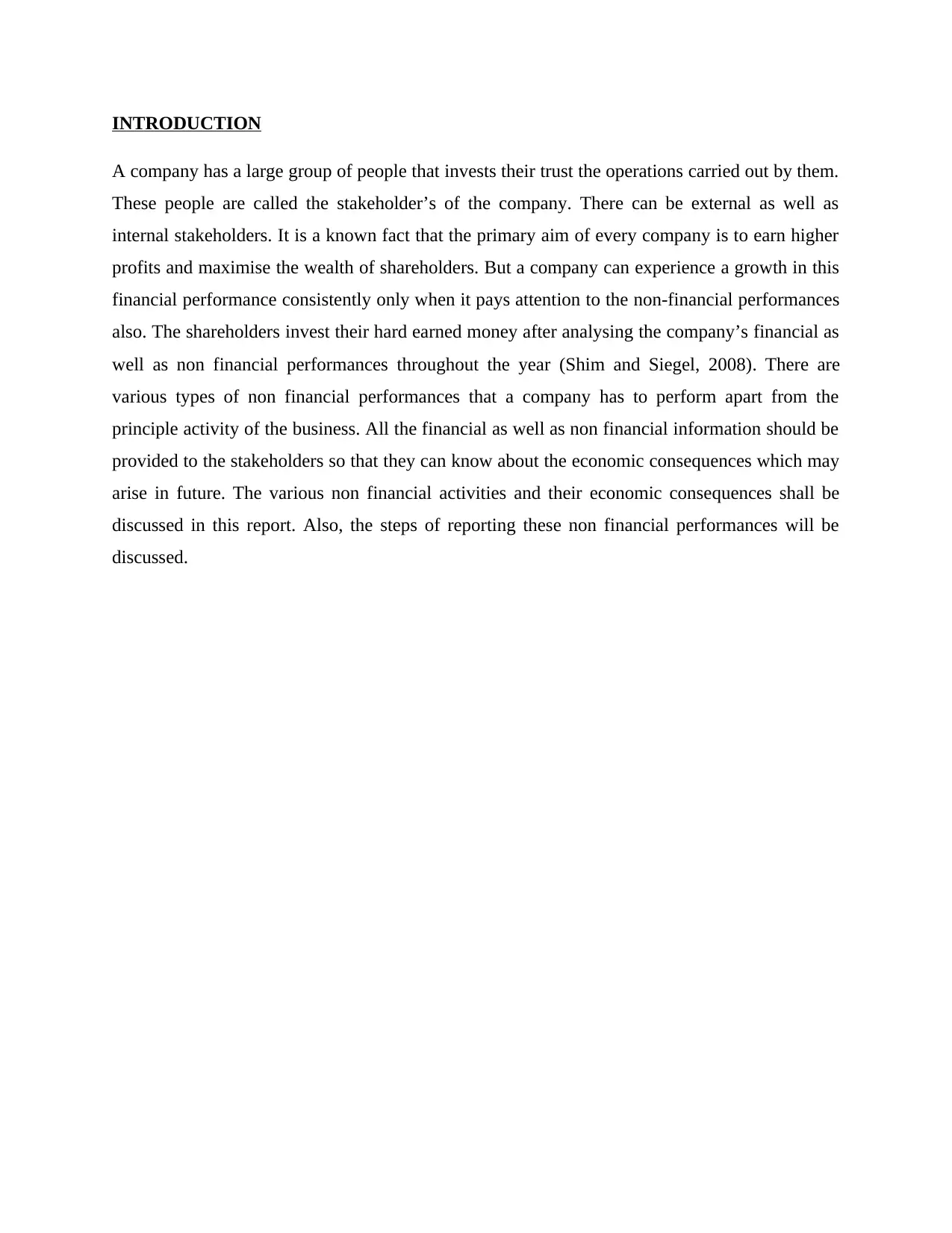
INTRODUCTION
A company has a large group of people that invests their trust the operations carried out by them.
These people are called the stakeholder’s of the company. There can be external as well as
internal stakeholders. It is a known fact that the primary aim of every company is to earn higher
profits and maximise the wealth of shareholders. But a company can experience a growth in this
financial performance consistently only when it pays attention to the non-financial performances
also. The shareholders invest their hard earned money after analysing the company’s financial as
well as non financial performances throughout the year (Shim and Siegel, 2008). There are
various types of non financial performances that a company has to perform apart from the
principle activity of the business. All the financial as well as non financial information should be
provided to the stakeholders so that they can know about the economic consequences which may
arise in future. The various non financial activities and their economic consequences shall be
discussed in this report. Also, the steps of reporting these non financial performances will be
discussed.
A company has a large group of people that invests their trust the operations carried out by them.
These people are called the stakeholder’s of the company. There can be external as well as
internal stakeholders. It is a known fact that the primary aim of every company is to earn higher
profits and maximise the wealth of shareholders. But a company can experience a growth in this
financial performance consistently only when it pays attention to the non-financial performances
also. The shareholders invest their hard earned money after analysing the company’s financial as
well as non financial performances throughout the year (Shim and Siegel, 2008). There are
various types of non financial performances that a company has to perform apart from the
principle activity of the business. All the financial as well as non financial information should be
provided to the stakeholders so that they can know about the economic consequences which may
arise in future. The various non financial activities and their economic consequences shall be
discussed in this report. Also, the steps of reporting these non financial performances will be
discussed.
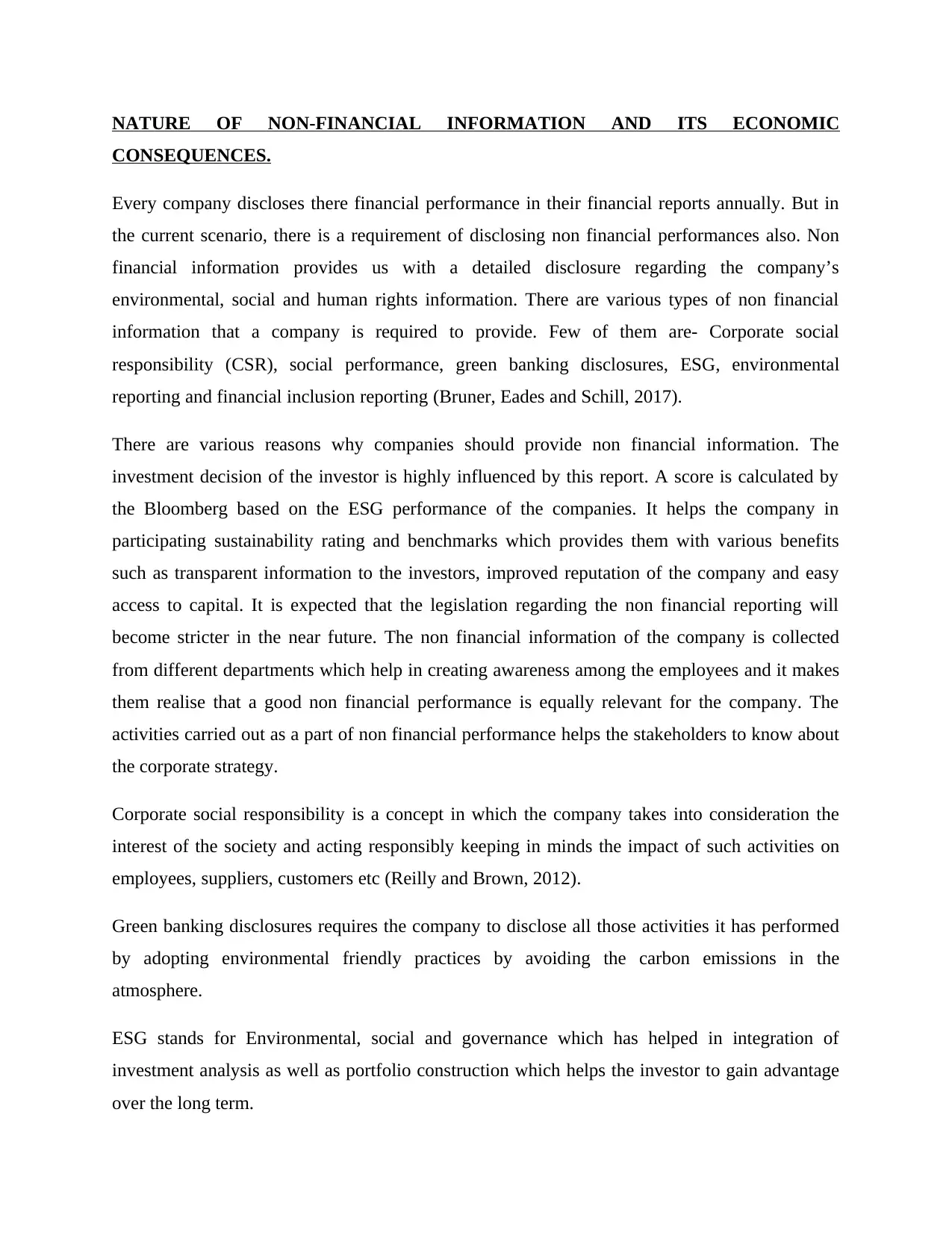
NATURE OF NON-FINANCIAL INFORMATION AND ITS ECONOMIC
CONSEQUENCES.
Every company discloses there financial performance in their financial reports annually. But in
the current scenario, there is a requirement of disclosing non financial performances also. Non
financial information provides us with a detailed disclosure regarding the company’s
environmental, social and human rights information. There are various types of non financial
information that a company is required to provide. Few of them are- Corporate social
responsibility (CSR), social performance, green banking disclosures, ESG, environmental
reporting and financial inclusion reporting (Bruner, Eades and Schill, 2017).
There are various reasons why companies should provide non financial information. The
investment decision of the investor is highly influenced by this report. A score is calculated by
the Bloomberg based on the ESG performance of the companies. It helps the company in
participating sustainability rating and benchmarks which provides them with various benefits
such as transparent information to the investors, improved reputation of the company and easy
access to capital. It is expected that the legislation regarding the non financial reporting will
become stricter in the near future. The non financial information of the company is collected
from different departments which help in creating awareness among the employees and it makes
them realise that a good non financial performance is equally relevant for the company. The
activities carried out as a part of non financial performance helps the stakeholders to know about
the corporate strategy.
Corporate social responsibility is a concept in which the company takes into consideration the
interest of the society and acting responsibly keeping in minds the impact of such activities on
employees, suppliers, customers etc (Reilly and Brown, 2012).
Green banking disclosures requires the company to disclose all those activities it has performed
by adopting environmental friendly practices by avoiding the carbon emissions in the
atmosphere.
ESG stands for Environmental, social and governance which has helped in integration of
investment analysis as well as portfolio construction which helps the investor to gain advantage
over the long term.
CONSEQUENCES.
Every company discloses there financial performance in their financial reports annually. But in
the current scenario, there is a requirement of disclosing non financial performances also. Non
financial information provides us with a detailed disclosure regarding the company’s
environmental, social and human rights information. There are various types of non financial
information that a company is required to provide. Few of them are- Corporate social
responsibility (CSR), social performance, green banking disclosures, ESG, environmental
reporting and financial inclusion reporting (Bruner, Eades and Schill, 2017).
There are various reasons why companies should provide non financial information. The
investment decision of the investor is highly influenced by this report. A score is calculated by
the Bloomberg based on the ESG performance of the companies. It helps the company in
participating sustainability rating and benchmarks which provides them with various benefits
such as transparent information to the investors, improved reputation of the company and easy
access to capital. It is expected that the legislation regarding the non financial reporting will
become stricter in the near future. The non financial information of the company is collected
from different departments which help in creating awareness among the employees and it makes
them realise that a good non financial performance is equally relevant for the company. The
activities carried out as a part of non financial performance helps the stakeholders to know about
the corporate strategy.
Corporate social responsibility is a concept in which the company takes into consideration the
interest of the society and acting responsibly keeping in minds the impact of such activities on
employees, suppliers, customers etc (Reilly and Brown, 2012).
Green banking disclosures requires the company to disclose all those activities it has performed
by adopting environmental friendly practices by avoiding the carbon emissions in the
atmosphere.
ESG stands for Environmental, social and governance which has helped in integration of
investment analysis as well as portfolio construction which helps the investor to gain advantage
over the long term.
⊘ This is a preview!⊘
Do you want full access?
Subscribe today to unlock all pages.

Trusted by 1+ million students worldwide
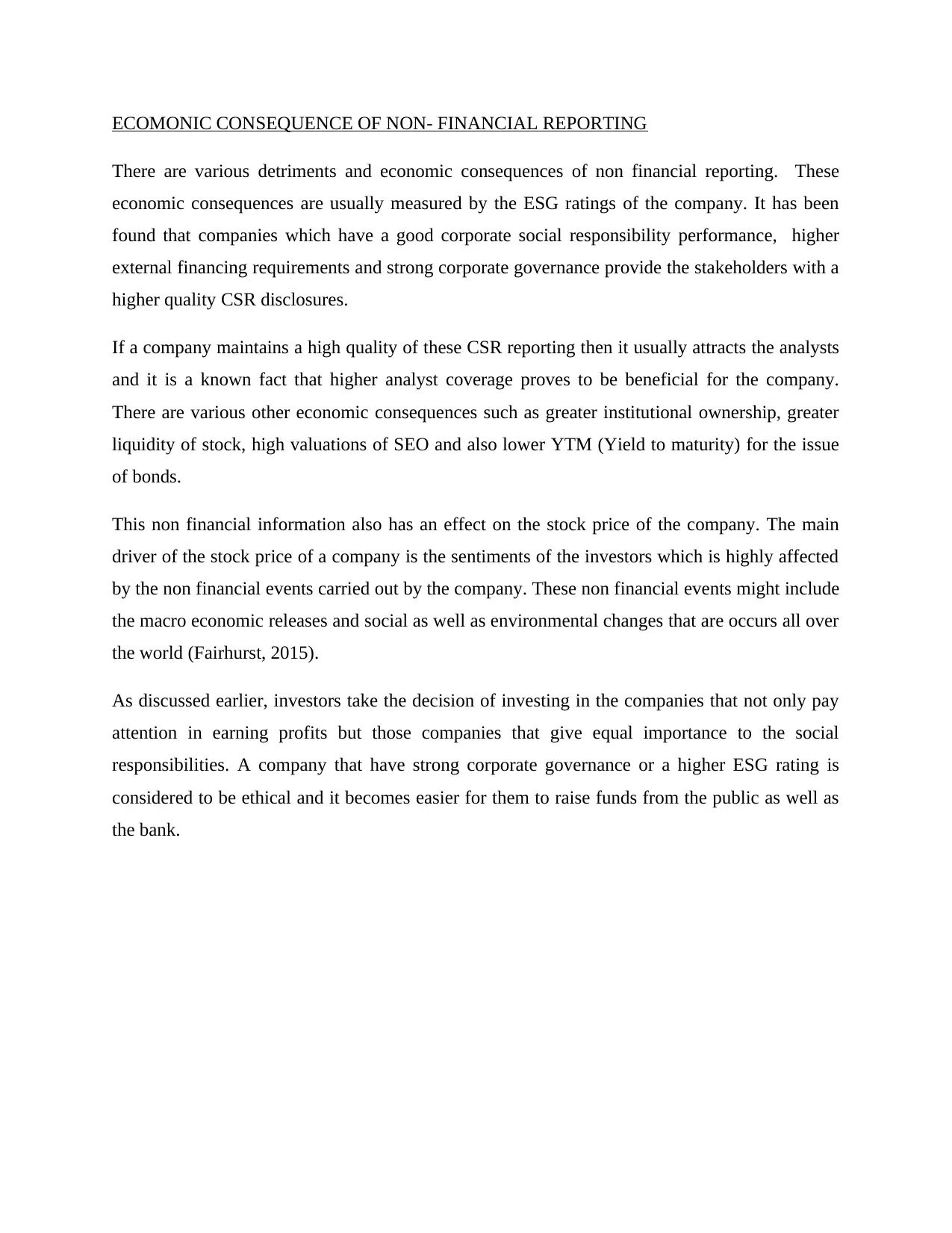
ECOMONIC CONSEQUENCE OF NON- FINANCIAL REPORTING
There are various detriments and economic consequences of non financial reporting. These
economic consequences are usually measured by the ESG ratings of the company. It has been
found that companies which have a good corporate social responsibility performance, higher
external financing requirements and strong corporate governance provide the stakeholders with a
higher quality CSR disclosures.
If a company maintains a high quality of these CSR reporting then it usually attracts the analysts
and it is a known fact that higher analyst coverage proves to be beneficial for the company.
There are various other economic consequences such as greater institutional ownership, greater
liquidity of stock, high valuations of SEO and also lower YTM (Yield to maturity) for the issue
of bonds.
This non financial information also has an effect on the stock price of the company. The main
driver of the stock price of a company is the sentiments of the investors which is highly affected
by the non financial events carried out by the company. These non financial events might include
the macro economic releases and social as well as environmental changes that are occurs all over
the world (Fairhurst, 2015).
As discussed earlier, investors take the decision of investing in the companies that not only pay
attention in earning profits but those companies that give equal importance to the social
responsibilities. A company that have strong corporate governance or a higher ESG rating is
considered to be ethical and it becomes easier for them to raise funds from the public as well as
the bank.
There are various detriments and economic consequences of non financial reporting. These
economic consequences are usually measured by the ESG ratings of the company. It has been
found that companies which have a good corporate social responsibility performance, higher
external financing requirements and strong corporate governance provide the stakeholders with a
higher quality CSR disclosures.
If a company maintains a high quality of these CSR reporting then it usually attracts the analysts
and it is a known fact that higher analyst coverage proves to be beneficial for the company.
There are various other economic consequences such as greater institutional ownership, greater
liquidity of stock, high valuations of SEO and also lower YTM (Yield to maturity) for the issue
of bonds.
This non financial information also has an effect on the stock price of the company. The main
driver of the stock price of a company is the sentiments of the investors which is highly affected
by the non financial events carried out by the company. These non financial events might include
the macro economic releases and social as well as environmental changes that are occurs all over
the world (Fairhurst, 2015).
As discussed earlier, investors take the decision of investing in the companies that not only pay
attention in earning profits but those companies that give equal importance to the social
responsibilities. A company that have strong corporate governance or a higher ESG rating is
considered to be ethical and it becomes easier for them to raise funds from the public as well as
the bank.
Paraphrase This Document
Need a fresh take? Get an instant paraphrase of this document with our AI Paraphraser
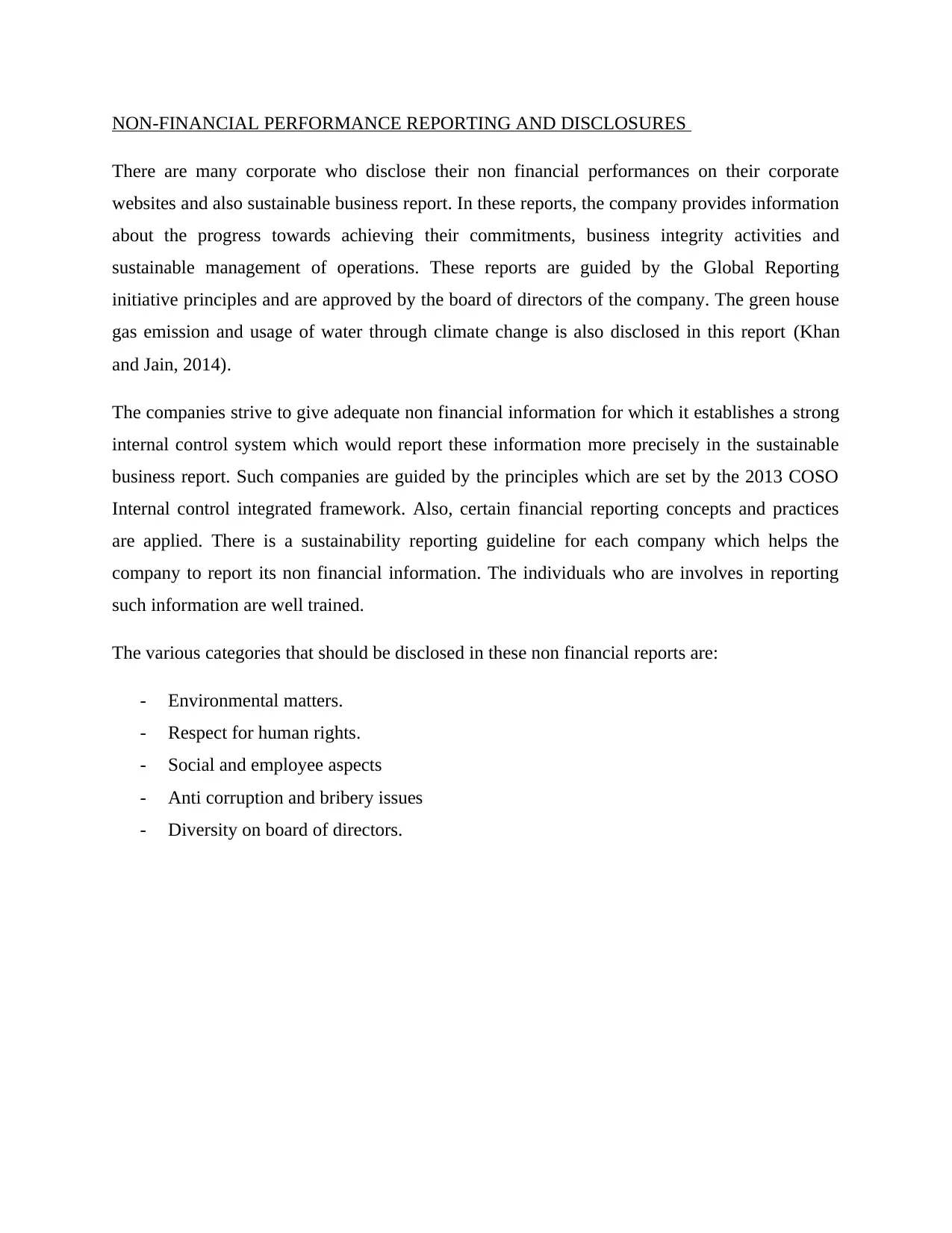
NON-FINANCIAL PERFORMANCE REPORTING AND DISCLOSURES
There are many corporate who disclose their non financial performances on their corporate
websites and also sustainable business report. In these reports, the company provides information
about the progress towards achieving their commitments, business integrity activities and
sustainable management of operations. These reports are guided by the Global Reporting
initiative principles and are approved by the board of directors of the company. The green house
gas emission and usage of water through climate change is also disclosed in this report (Khan
and Jain, 2014).
The companies strive to give adequate non financial information for which it establishes a strong
internal control system which would report these information more precisely in the sustainable
business report. Such companies are guided by the principles which are set by the 2013 COSO
Internal control integrated framework. Also, certain financial reporting concepts and practices
are applied. There is a sustainability reporting guideline for each company which helps the
company to report its non financial information. The individuals who are involves in reporting
such information are well trained.
The various categories that should be disclosed in these non financial reports are:
- Environmental matters.
- Respect for human rights.
- Social and employee aspects
- Anti corruption and bribery issues
- Diversity on board of directors.
There are many corporate who disclose their non financial performances on their corporate
websites and also sustainable business report. In these reports, the company provides information
about the progress towards achieving their commitments, business integrity activities and
sustainable management of operations. These reports are guided by the Global Reporting
initiative principles and are approved by the board of directors of the company. The green house
gas emission and usage of water through climate change is also disclosed in this report (Khan
and Jain, 2014).
The companies strive to give adequate non financial information for which it establishes a strong
internal control system which would report these information more precisely in the sustainable
business report. Such companies are guided by the principles which are set by the 2013 COSO
Internal control integrated framework. Also, certain financial reporting concepts and practices
are applied. There is a sustainability reporting guideline for each company which helps the
company to report its non financial information. The individuals who are involves in reporting
such information are well trained.
The various categories that should be disclosed in these non financial reports are:
- Environmental matters.
- Respect for human rights.
- Social and employee aspects
- Anti corruption and bribery issues
- Diversity on board of directors.
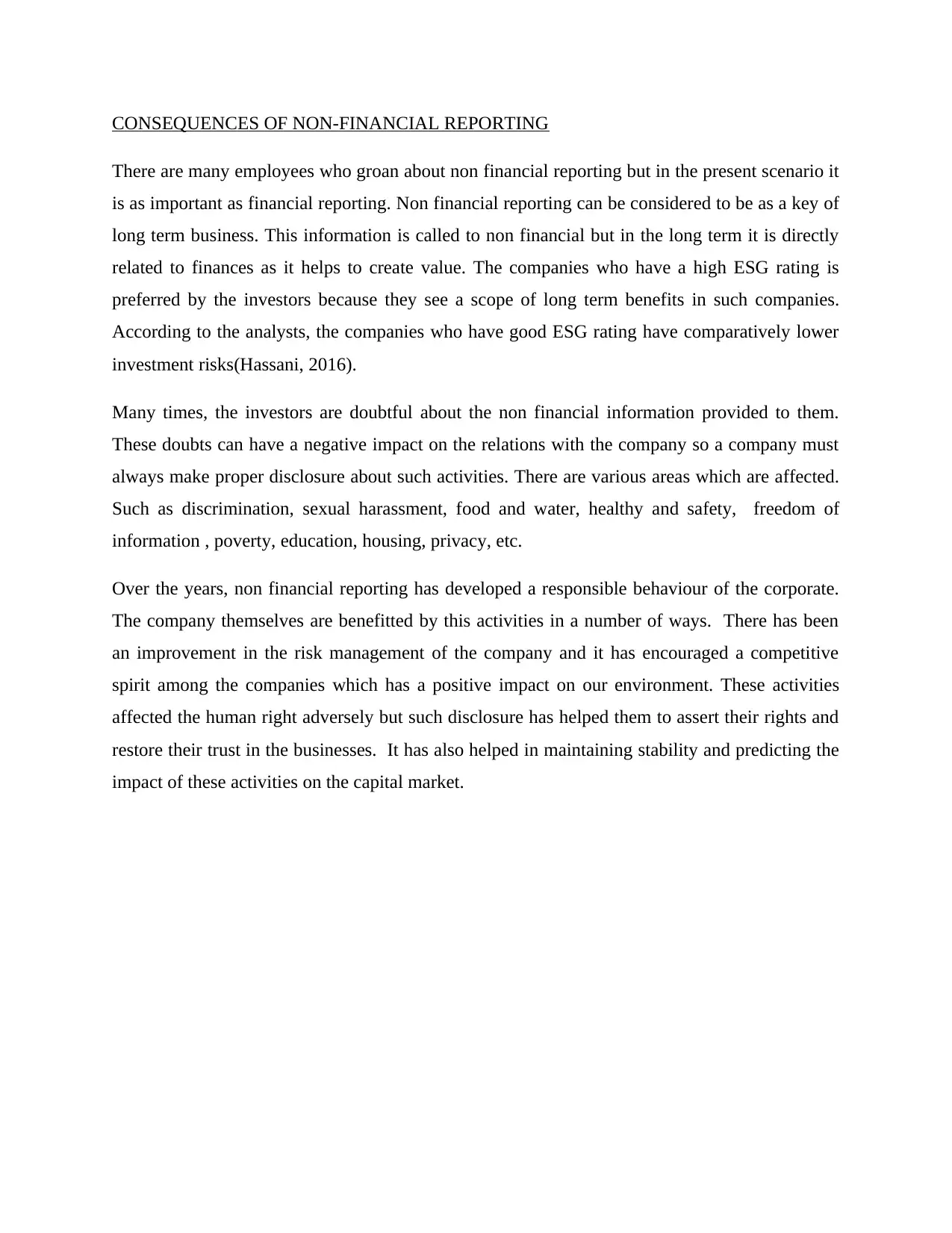
CONSEQUENCES OF NON-FINANCIAL REPORTING
There are many employees who groan about non financial reporting but in the present scenario it
is as important as financial reporting. Non financial reporting can be considered to be as a key of
long term business. This information is called to non financial but in the long term it is directly
related to finances as it helps to create value. The companies who have a high ESG rating is
preferred by the investors because they see a scope of long term benefits in such companies.
According to the analysts, the companies who have good ESG rating have comparatively lower
investment risks(Hassani, 2016).
Many times, the investors are doubtful about the non financial information provided to them.
These doubts can have a negative impact on the relations with the company so a company must
always make proper disclosure about such activities. There are various areas which are affected.
Such as discrimination, sexual harassment, food and water, healthy and safety, freedom of
information , poverty, education, housing, privacy, etc.
Over the years, non financial reporting has developed a responsible behaviour of the corporate.
The company themselves are benefitted by this activities in a number of ways. There has been
an improvement in the risk management of the company and it has encouraged a competitive
spirit among the companies which has a positive impact on our environment. These activities
affected the human right adversely but such disclosure has helped them to assert their rights and
restore their trust in the businesses. It has also helped in maintaining stability and predicting the
impact of these activities on the capital market.
There are many employees who groan about non financial reporting but in the present scenario it
is as important as financial reporting. Non financial reporting can be considered to be as a key of
long term business. This information is called to non financial but in the long term it is directly
related to finances as it helps to create value. The companies who have a high ESG rating is
preferred by the investors because they see a scope of long term benefits in such companies.
According to the analysts, the companies who have good ESG rating have comparatively lower
investment risks(Hassani, 2016).
Many times, the investors are doubtful about the non financial information provided to them.
These doubts can have a negative impact on the relations with the company so a company must
always make proper disclosure about such activities. There are various areas which are affected.
Such as discrimination, sexual harassment, food and water, healthy and safety, freedom of
information , poverty, education, housing, privacy, etc.
Over the years, non financial reporting has developed a responsible behaviour of the corporate.
The company themselves are benefitted by this activities in a number of ways. There has been
an improvement in the risk management of the company and it has encouraged a competitive
spirit among the companies which has a positive impact on our environment. These activities
affected the human right adversely but such disclosure has helped them to assert their rights and
restore their trust in the businesses. It has also helped in maintaining stability and predicting the
impact of these activities on the capital market.
⊘ This is a preview!⊘
Do you want full access?
Subscribe today to unlock all pages.

Trusted by 1+ million students worldwide
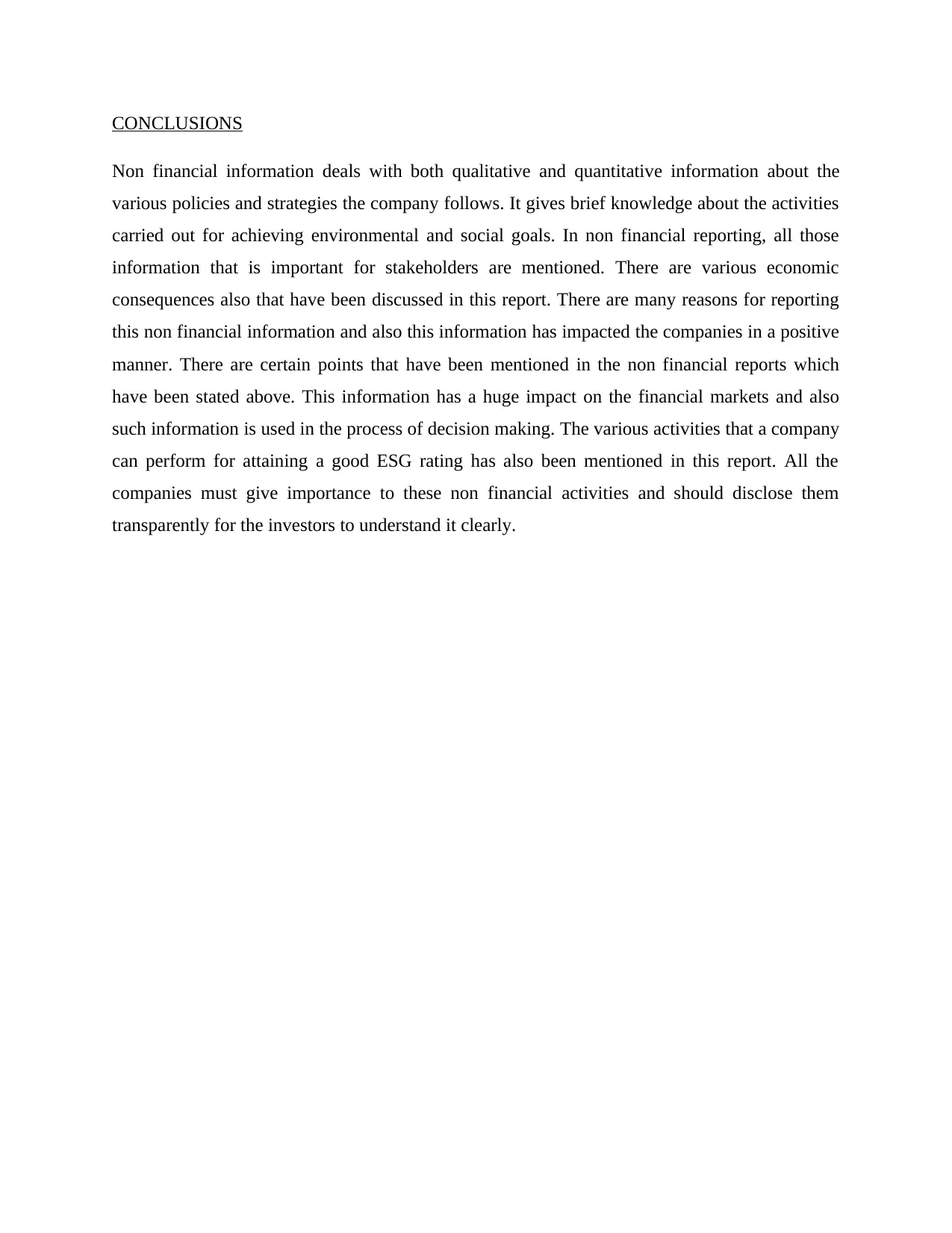
CONCLUSIONS
Non financial information deals with both qualitative and quantitative information about the
various policies and strategies the company follows. It gives brief knowledge about the activities
carried out for achieving environmental and social goals. In non financial reporting, all those
information that is important for stakeholders are mentioned. There are various economic
consequences also that have been discussed in this report. There are many reasons for reporting
this non financial information and also this information has impacted the companies in a positive
manner. There are certain points that have been mentioned in the non financial reports which
have been stated above. This information has a huge impact on the financial markets and also
such information is used in the process of decision making. The various activities that a company
can perform for attaining a good ESG rating has also been mentioned in this report. All the
companies must give importance to these non financial activities and should disclose them
transparently for the investors to understand it clearly.
Non financial information deals with both qualitative and quantitative information about the
various policies and strategies the company follows. It gives brief knowledge about the activities
carried out for achieving environmental and social goals. In non financial reporting, all those
information that is important for stakeholders are mentioned. There are various economic
consequences also that have been discussed in this report. There are many reasons for reporting
this non financial information and also this information has impacted the companies in a positive
manner. There are certain points that have been mentioned in the non financial reports which
have been stated above. This information has a huge impact on the financial markets and also
such information is used in the process of decision making. The various activities that a company
can perform for attaining a good ESG rating has also been mentioned in this report. All the
companies must give importance to these non financial activities and should disclose them
transparently for the investors to understand it clearly.
Paraphrase This Document
Need a fresh take? Get an instant paraphrase of this document with our AI Paraphraser
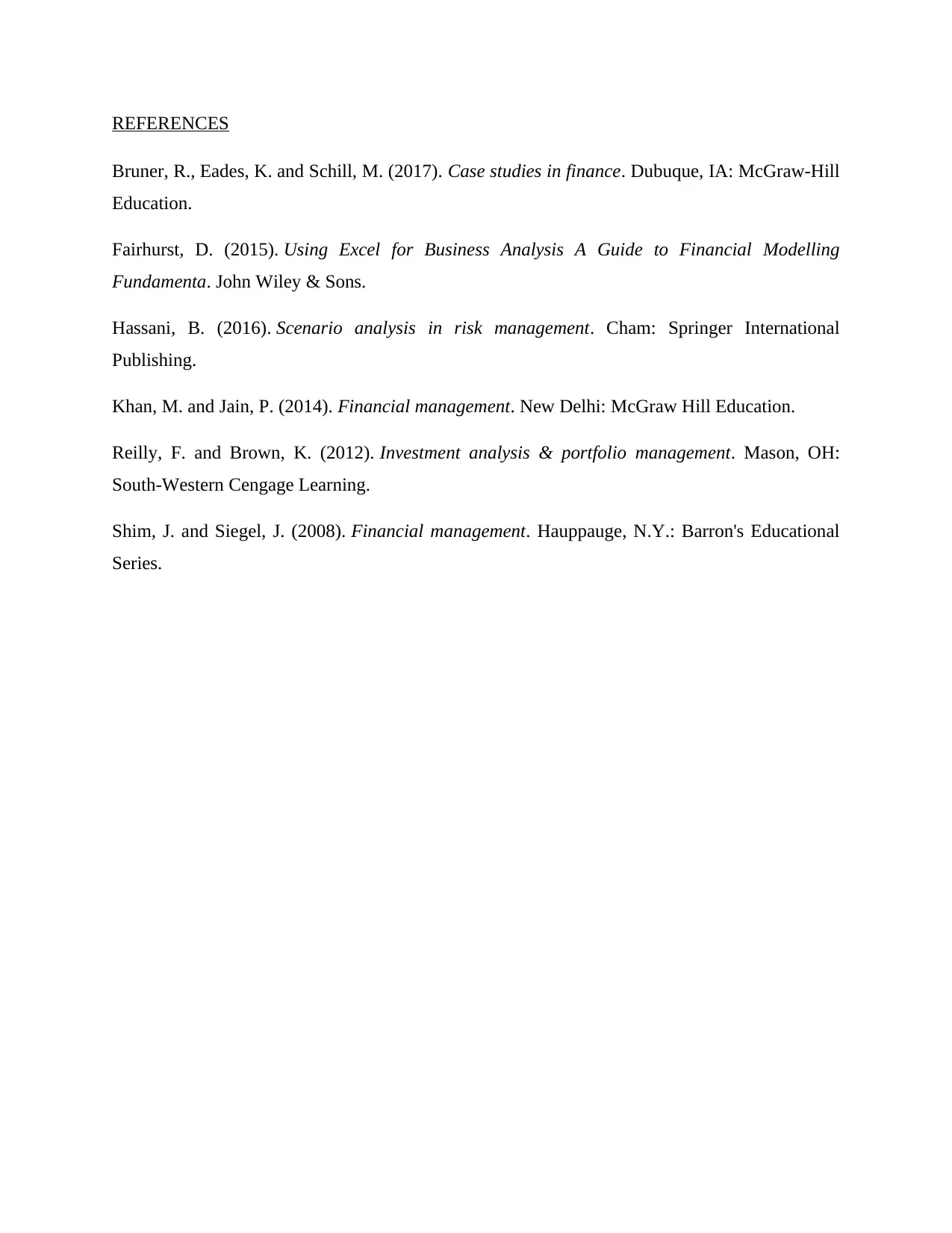
REFERENCES
Bruner, R., Eades, K. and Schill, M. (2017). Case studies in finance. Dubuque, IA: McGraw-Hill
Education.
Fairhurst, D. (2015). Using Excel for Business Analysis A Guide to Financial Modelling
Fundamenta. John Wiley & Sons.
Hassani, B. (2016). Scenario analysis in risk management. Cham: Springer International
Publishing.
Khan, M. and Jain, P. (2014). Financial management. New Delhi: McGraw Hill Education.
Reilly, F. and Brown, K. (2012). Investment analysis & portfolio management. Mason, OH:
South-Western Cengage Learning.
Shim, J. and Siegel, J. (2008). Financial management. Hauppauge, N.Y.: Barron's Educational
Series.
Bruner, R., Eades, K. and Schill, M. (2017). Case studies in finance. Dubuque, IA: McGraw-Hill
Education.
Fairhurst, D. (2015). Using Excel for Business Analysis A Guide to Financial Modelling
Fundamenta. John Wiley & Sons.
Hassani, B. (2016). Scenario analysis in risk management. Cham: Springer International
Publishing.
Khan, M. and Jain, P. (2014). Financial management. New Delhi: McGraw Hill Education.
Reilly, F. and Brown, K. (2012). Investment analysis & portfolio management. Mason, OH:
South-Western Cengage Learning.
Shim, J. and Siegel, J. (2008). Financial management. Hauppauge, N.Y.: Barron's Educational
Series.
1 out of 8
Related Documents
Your All-in-One AI-Powered Toolkit for Academic Success.
+13062052269
info@desklib.com
Available 24*7 on WhatsApp / Email
![[object Object]](/_next/static/media/star-bottom.7253800d.svg)
Unlock your academic potential
Copyright © 2020–2026 A2Z Services. All Rights Reserved. Developed and managed by ZUCOL.



